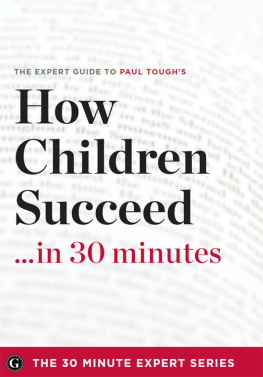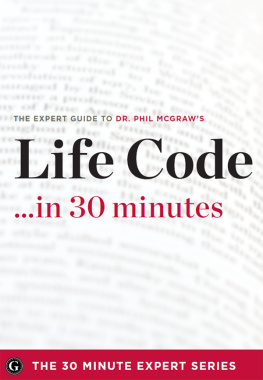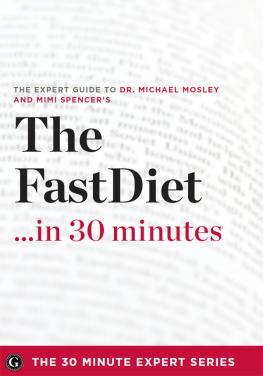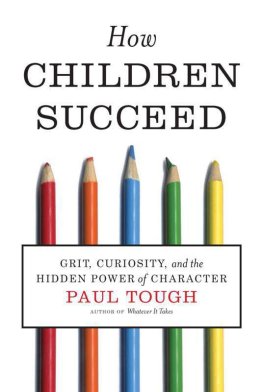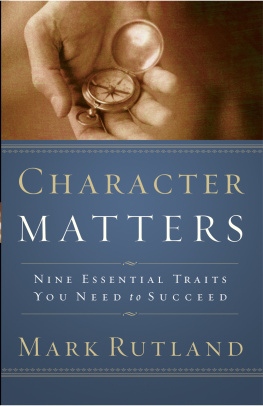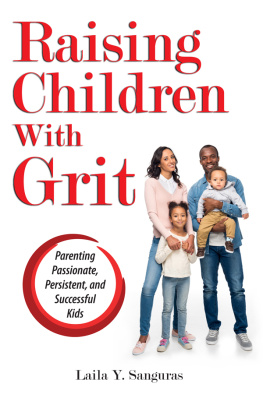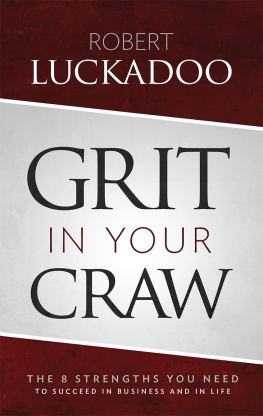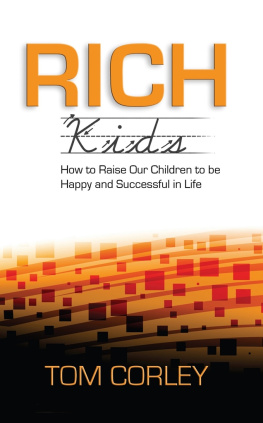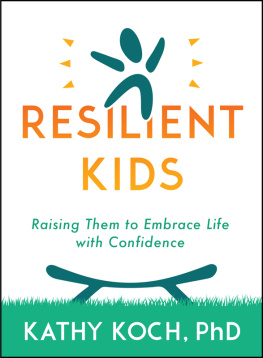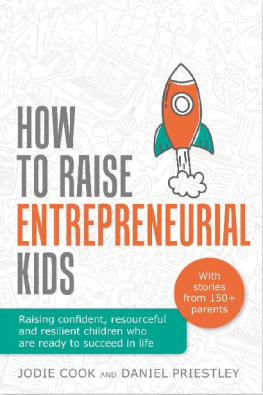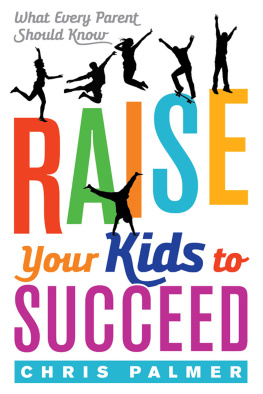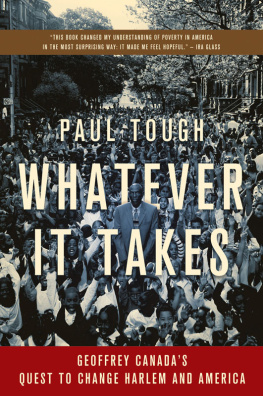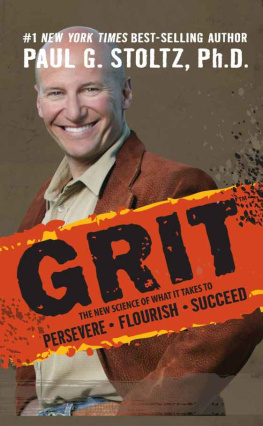INTRODUCTION
At a Glance
This book is an extended review of How Children Succeed: Grit, Curiosity, and the Hidden Power of Character, a best seller whose author, Paul Tough, explains the defining characteristics that encourage children to grow academically and intellectually and develop the fortitude to endure in even the most challenging situations. To uncover what determines childrens success, Tough uses interviews with educators, economists, psychologists, and neuroscientists in addition to academic studies and longitudinal studies comparing students from a variety of economic, familial, and educational backgrounds.
The review begins with a brief introduction to How Children Succeed. Next comes a section that includes information about the book and the author, a summary of readers responses to the bookthe good and the not so good, from professional reviewers as well as from bloggers and other interested readersand a synopsis of How Children Succeed. That section is followed by a detailed discussion of the books key concepts. Finally, the main points of this review are briefly restated, in a way that may well inspire you to get your own copy of Paul Toughs book and see for yourself why How Children Succeed is such a favorite with readers. Also included are a list of key terms used in How Children Succeed and recommendations for further reading about how to build character and resilience in the children in your life so they can become successful adults.
Understanding
How Children Succeed
ABOUT THE BOOK
During the summer of 2009, Paul Tough spent a day observing a group of prekindergartners in a classroom at an elementary school in New Jersey. The preschoolers were enrolled in a research-based early-childhood curriculum called Tools of the Mind, based on the work of the Russian psychologist Lev Vygotsky (18961934). The curriculums educational approach focuses not on teaching reading and mathematics, commonly referred to as cognitive skills, but on helping children learn a variety of what are often called soft or noncognitive skills, such as controlling impulses, staying focused on tasks, avoiding distractions, organizing ideas, and controlling emotions. Tough noticed that none of the four-year-olds he observed were acting out, crying, or throwing tantrums. They were all engaged in what he calls mature dramatic play.
When Tough, a new father, reflected on the prospects of his own infant son, he realized that he wanted to understand more specifically what makes a child happy and successful. He learned through research and countless interviews that noncognitive skills like persistence, self-control, curiosity, conscientiousness, grit, and self-confidencesaid to be traits that constitute a persons characterare what matter most in a childs development. He learned, in short, that the strength of a childs character is what will have the strongest impact on the childs overall happiness, success, and achievement later in life.
Looking more closely at the Tools of the Mind curriculums unconventional approach to education, Tough became acquainted with the research of James Heckman, an economist at the University of Chicago. Since 2008, Heckman had been regularly gathering with select economists and psychologists to discuss which skills and character traits lead to success, how these skills and traits develop in children, and what can be done to boost childrens academic performance. The findings of Heckman and his colleagues, eventually published in 2010that curiosity, self-control, and social fluidity are key determinants of a childs successecho the philosophical approach of the Tools of the Mind curriculum. Heckmans research also showed Tough that the ability to persist through a boring task and delay gratification is central to a rewarding life. It was Toughs own continued research into the power of character that led him to write and publish How Children Succeed.
ABOUT THE AUTHOR
Paul Tough was born in Toronto, Canada, in 1967 and attended the preparatory University of Toronto Schools. Before writing How Children Succeed, published in 2012, Tough worked as an editor at the New York Times Magazine. His writing, which largely focuses on education, poverty, and politics, has appeared in Slate, GQ, Esquire, and The New Yorker. He has written cover stories for the New York Times Magazine on the No Child Left Behind Act, charter schools, post-Katrina conditions in the New Orleans school system, and the Harlem Childrens Zone Project. That project became the subject of Toughs first book, Whatever It Takes: Geoffrey Canadas Quest to Change Harlem, published in 2008. The book detailed a comprehensive effort to better the lives of parents and children living in that ninety-seven-block area of New York City, and it stirred debate over the intersection of poverty and parenting in urban America.
As a teenager in Canada, Tough cohosted the Canadian Broadcasting Corporations youth radio show Anybody Home? He first moved to the United States in 1988 and worked for Harpers magazine. In 1996 he became senior editor of Ira Glasss weekly NPR show This American Life, to which he still contributes. In 1998 he returned to Canada to work as an editor for the magazine Saturday Night, but he returned to the United States in 2000 and founded the online daily magazine Open Letters, which he edited and published from June 19, 2000 to January 5, 2001. Tough currently lives in New York with his wife and their son.
CRITICAL RECEPTION
The Upside
In her review for the New York Times, Anne Murphy Paul describes How Children Succeed as an absorbing and important book. Geraldine Brennan, writing for the Guardian, praises the book for being much more than the straightforward grow clever children manual it appears to be. At the Huffington Post, Linda Flanagan writes that the book sings with humanity while also incorporating science and research into its conclusions. Kirkus Reviews proclaims How Children Succeed as well-written and bursting with ideas, not to mention essential reading for anyone who cares about childhood in America. Booklists Vanessa Bush echoes that assessment, calling the book a very hopeful look at promising new research on education. Jay Matthews of the Washington Post also applauds Paul Tough: A wonderfully written new book reveals a school improvement measure in its infancy that has the potential to transform our schools. In fact, most reviewers for mainstream media outlets have celebrated Toughs book as an absorbing account of the perils Americas children face and of the power that character has to reconstruct their likely futures.
Writers for parenting blogs and other online resourcesfor example, the blogger Sunshine of Sunshine Parenting and Natasha Burgert of the KC Kids Doc websitehave described How Children Succeed as a must-read for parents seeking practical advice on how to nurture success in their children. Some of these writers on parenting even herald the book as a manual for bringing up the next generation, whereas others look to it for insights into the types of relationships they should forge with their own children.
In his review of How Children Succeed for Global Atlanta, Doug Shipman, CEO of the National Center for Civil and Human Rights, notes the books relevance to his own children and describes how he has been inspired by the successful programs highlighted in the book. If you care about childrens development or education policy, he writes,

